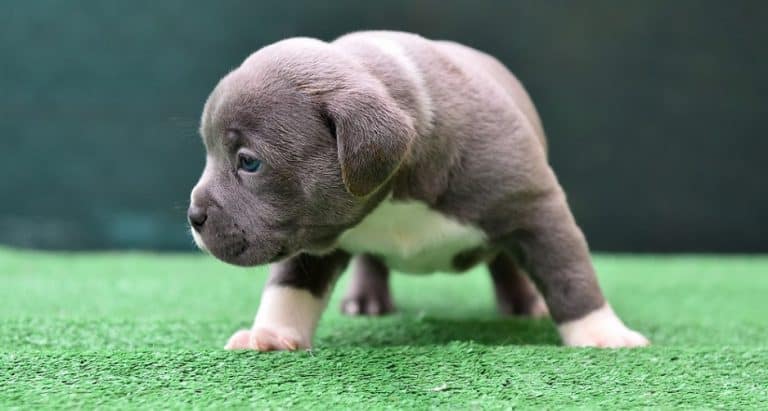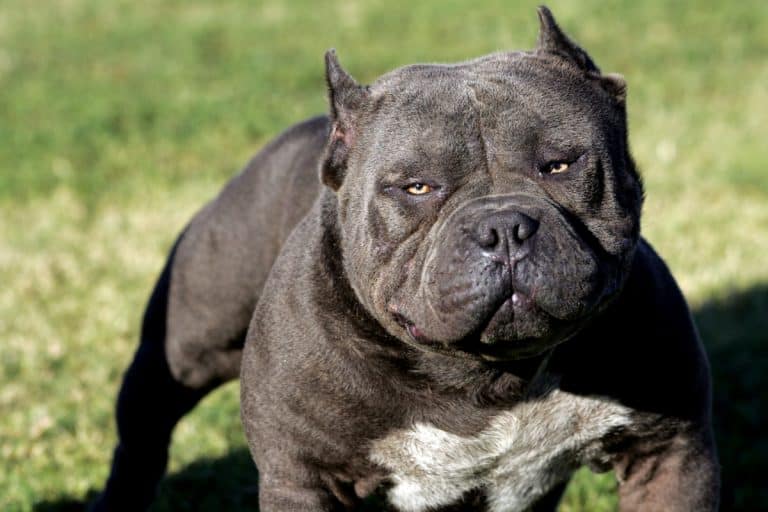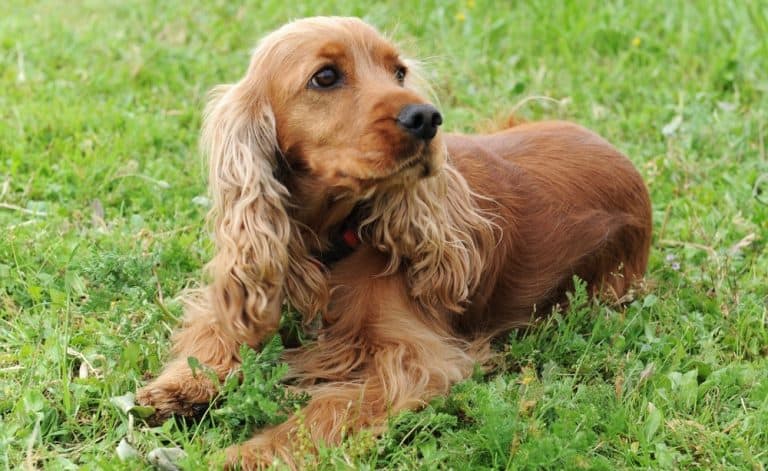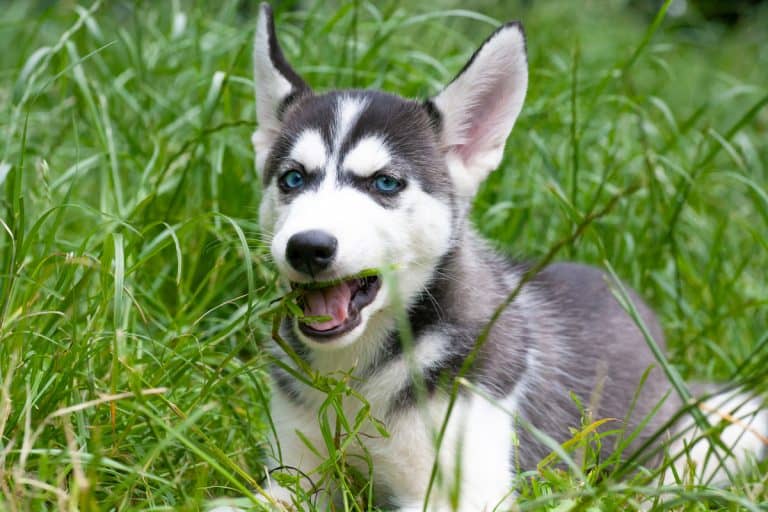Everything You Need To Know About The Basschshund
Have you ever heard of a basschshund before? The clue is in the name as to the origin of this fascinating dog! A basschshund is the cross between a dachshund and a basset hound, and has very similar features from both parents.
These are sociable dogs who love to spend time with their owners, and they tend to be smart and have very sweet natures.
Basschshunds are recognizable from their longer bodies; this is a cross between the dachshund and the basset hound. They have the same short legs as their parents, but tend to be in between in terms of their body size.
They are considered to be a medium sized dog that features a longer snout, and has floppy ears.
This is the ideal breed to opt for as a family pet. Basschshunds tend to be loving and friendly dogs, and don’t need a lot of maintenance to take care of them.
They can be a little stubborn without the proper training, so it’s worth bearing this in mind if you’re considering a basschshund for your next pet.
But is the basschshund the ideal family pet for you and your loved ones? Find out everything that you need to know about the basschshund in our comprehensive guide down below!
How Does The Basschshund Compare To The Dachshund Or The Basset Hound?
| Basschshund | Dachshund | Basset Hound | |
| Type of dog | Mixed breed | Hound | Hound |
| Start of breed | 1900s | 1600s | 1700s |
| Original country | America | Germany | France |
| Average size | Medium breed | Small to medium | Medium breed |
| Average height | 8 inches to 11 inches | 8 inches to 9 inches | 12 inches to 14 inches |
| Average weight | Between 25 pounds to 45 pounds | 11 pounds for a miniature dachshund and between 16 pounds to 32 pounds for a full size dachshund | Between 45 pounds to 65 pounds |
| Average life span | 12 to 15 years | 12 years to 15 years | 10 to 12 years |
| Type of coat | Typically short hair, but can be longer if they had a long haired parent | Smooth haired, long haired, or wire haired | Short hair |
| How often do they shed? | Minimal to medium shedding depending on coat length | Moderate shedding | Minimal shedding |
| Brushing requirements | Brushing needed 1 to 3 times a week depending on the length of their coat | Brushing needed 1 to 3 times a week depending on the length of their coat | Once a week |
| Grooming requirements | Depends on the coat length, with longer coats needing more grooming | Dependent on coat length, with longer coats needing moderate to minimal grooming | Minimal shedding |
| Average temperament | Stubborn, affectionate, gentle | Stubborn, smart, playful, mischievous | Stubborn, eager to please, affectionate |
| Ease of training | Medium | Difficult | Medium |
| Suitability for homes with kids | Yes | Yes | Yes |
| Suitability for homes with other dogs | Medium suitability | Medium suitability | Yes |
| Suitable for families | Yes | Yes | Yes |
| Suitability for small homes and apartments | Yes | Yes | Yes |
| Are they good with other pets? | Depends on the pets | No | Yes |
| Are they ideal for new owners? | Yes | Yes | Yes |
| Easily irritated | Yes | Yes | Yes |
| Solitude tolerance | Low | Low | Low |
| Heat tolerance | Low | Medium | Low |
| Cold tolerance | Medium | Low | Medium |
| Likelihood to bark | Very likely | Very likely | Very likely |
| How often do they need exercise? | Between 30 to 60 minutes every day | Between 30 to 60 minutes every day | Between 30 to 60 minutes every day |
| Likeliness to gain weight? | Very likely | Very likely | Very likely |
Basschshund: A More In Depth View
Let’s take a closer look at the basschshund to better understand some of their more prominent traits.
Stubborn, Loving, And Friendly
On the whole, basschshunds tend to be very loving and friendly towards their owners. They don’t have to have your constant attention, but they will eagerly lap up any attention that you give them.
However, they have inherited their stubborn streak from both their dachshund and basset hound parents. Positive reinforcement is the best method for tackling this.
Low Energy And Relatively Laid Back
The basschshund tends to be a relatively laid back breed because of the low energy inherited from their basset hound parent.
So you won’t have as many of the anxious traits from the dachshund parent such as digging, fighting, guarding, chasing, or any other feisty behaviors which can become a pain.
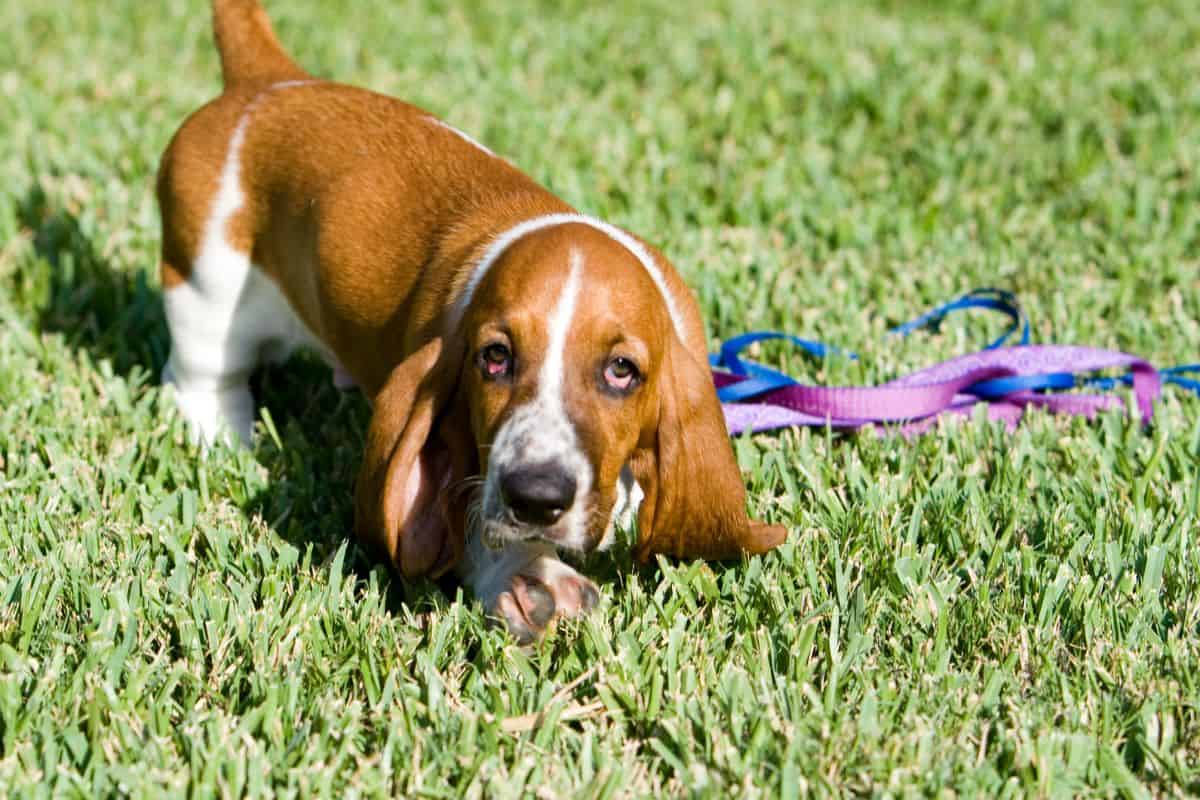
The Perfect Family Dog
The basschshund is the perfect family dog. They have a low tolerance for being left on their own, and like to be around people all the time.
Combined with their chilled out attitude, this makes them ideal for busy households where someone is always about.
Ideal For Small Apartments
Seeing as the basschshund is a rather small hound compared to other larger breeds, this makes them ideal for smaller homes such as apartments.
They also don’t need a lot of exercise, so they won’t get wound up with a smaller space.
The only thing to bear in mind is that they do suffer from separation anxiety, which could make your basschshund howl or bark when you’re gone for extended periods of time. It’s best to use crate training so that they don’t become destructive in the home.
Requires Very Little Maintenance And Grooming
The good thing about choosing a basschshund as your family pet is that they don’t tend to have long fur.
The only exception would be if their dachshund parent is long haired, in which case, they would be more likely to have longer fur. But the vast majority of basschshunds tend to be relatively low maintenance and don’t need a lot of grooming.
Ideal Guard Dogs For The Home
You’ll certainly know if anyone invades your home with the basschshund as your guard dog. This is a dog that tends to have a deep bark, so you’ll be immediately alerted if someone breaks into your home.
Basschshund: Pros And Cons
Let’s take a closer look at the pros and cons of owning a basschshund so you can see if this is the right fit for you and your home.
Pros Of Owning A Basschshund
Basschshunds are wonderfully versatile pets that will be ideal for a range of owners. These tend to be very friendly dogs that are sweet natured, not to mention loving towards all members of your family.
These dogs aren’t naturally aggressive, so you won’t have to worry about them getting aggressive towards any children in your home.
If you have a smaller home such as an apartment, then the basschshund will be the ideal pet for you. These tend to be relatively low energy dogs, so you won’t have to worry about them needing lots of room to run around.
You can easily stimulate your basschshund by giving them lots of toys to play with around the home.
You’ll get the added benefit of a watchdog if you opt for a basschshund. They are naturally aware of any intruders in your home, and will bark to tell you when someone has broken into your home.
Cons Of Owning A Basschshund
The major downside to the basschshund breed is that they have inherited their stubbornness from both of their parents. Both the dachshund and the basset hound have reputations for being stubborn, and the basschshund has inherited this.
So this means that you will need to use lots of positive reinforcement when it comes to training your basschshund, as they don’t tend to listen all that well.
If your basschshund has picked up a scent while out on a walk, you may notice that they tend to follow this and just ignore your calls to return to them. So this is something to be mindful of if you plan on letting them off the lead at any time.
However, you can also use this as a training tactic around the home or backyard.
Seeing as both the basset hound and the dachshund were bred for hunting down small prey, the basschshund has inherited this fascination for smaller creatures.
So if you have any smaller animals around your home such as rabbits, it’s best to keep an eye on your basschshund just in case they try to hunt them.
The Temperament Of A Basschshund
If you’re looking for a pet that has the ideal temperament for a family home, then you can’t do better than the basschshund.
This is a breed that has inherited the chilled and laid back temperament of the basset hound, so they are pretty easy going. These are very friendly animals that love to be around people.
The only thing to bear in mind is that the basschshund doesn’t like being left alone for long periods of time, and they can suffer from separation anxiety as a result.
If you were to leave your basschshund alone in the home they may become destructive, and your neighbors will notice an increase in barking and howling.
However, the basschshund doesn’t need constant attention when you are home. So this makes them ideal for those who work from home or who can’t give their pet undivided attention all the time.
So as long as you’re nearby, your basschshund will be happy to chill in their basket.
You will need to bear in mind that your basschshund will have a stubborn streak thanks to its parents, so you may find that they have selective hearing when you’re trying to give them a command.
Avoid punishments and scolding, and try to use positive reinforcement instead. Patience will be key for training your basschshund.
The Average Life Expectancy Of A Basschshund
Seeing as the basschshund is a mixed breed between a dachshund and a basset hound, it can be confusing knowing how long your pet is likely to live. On the whole, the basschshund tends to have a life expectancy of between 12 years to 15 years.
It will be mostly down to their lineage and overall health, with their dachshund parents being more likely to outlive basset hounds.
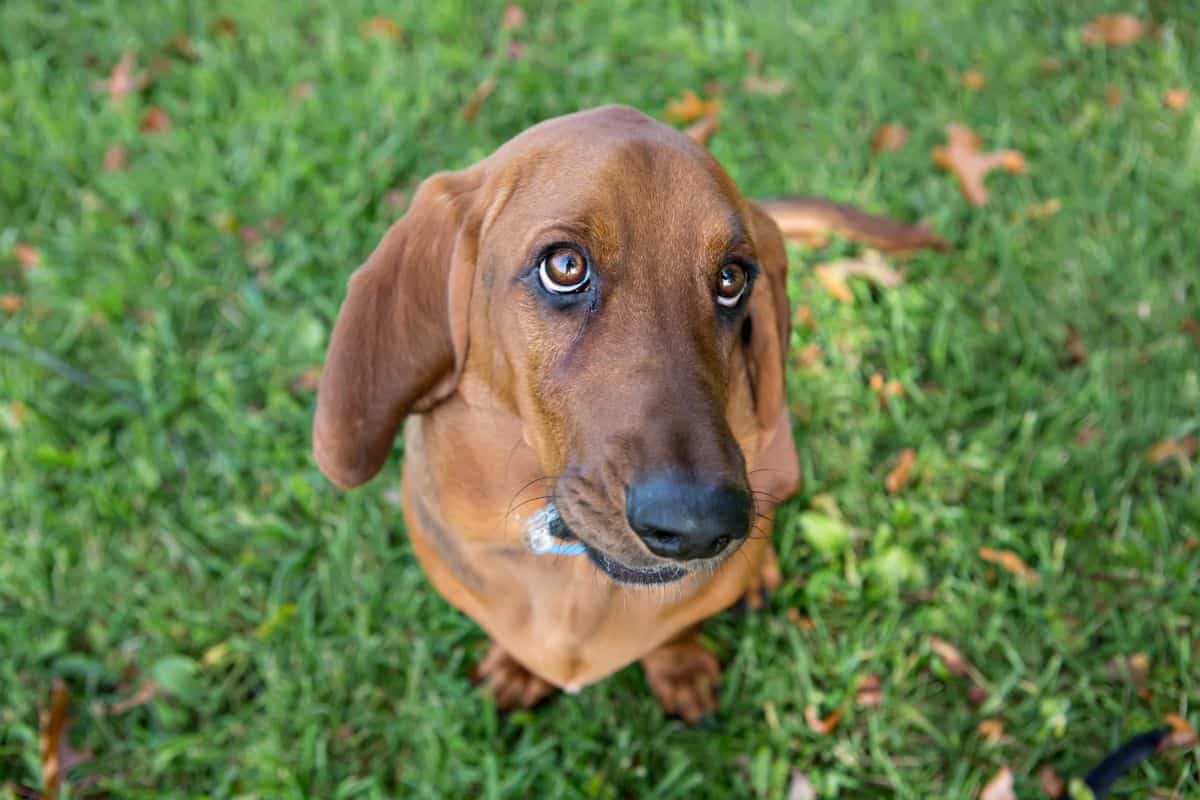
Basschshund: Appearance And Size
In terms of their appearance and size, the basschshund will differ depending on their parents.
If their dachshund parent was a miniature dachshund rather than a full size dachshund, this may mean that they are slightly smaller than other basschshund which have a full dachshund parent.
On the whole, you will find that your basschshund tends to be around medium height. They have a longer snout than their basset hound parent, and tend to have adorable floppy ears.
Similar to their dachshund and basset hound parents, the basschshund tends to have a longer back and shorter legs.
The weight of your basschshund will differ depending on how much you feed them and how active they are. They tend to vary between 25 pounds to 45 pounds, but they can be susceptible to weight gain because of their preferred sedentary lifestyle.
Their overall weight may differ depending on that of their parents.
What Coat Colors Do Basschshunds Have?
The vast majority of basschshunds tend to have shorter, smooth haired coats. However, if the basschshund has a long haired or wire haired dachshund parent, this can influence their coat to be similar.
The shorter coat tends to be very low maintenance and won’t need much grooming at all.
The coloring of your basschshund’s coat will depend on their parent’s coat colors. They tend to feature black, white, chestnut, brown, gray, or a combination of any of these colors. The areas around their eyes, nose, and lips tend to be darker.
The Grooming Needs Of Your Basschshund
Remember that if you have a longer haired basschshund, then they will require more grooming than a standard short haired dog. But on the whole, your basschshund won’t need a lot of grooming if they are short haired.
It’s recommended that you brush their coat around once a week, but anything more than this will be unnecessary.
It’s best to take care when washing your basschshund’s ears, as you won’t want to get any water or soaps into their ears. You can always opt for veterinary ear wipes to make things easier on you and gentler on your pet.
Make sure to trim your basschshund’s nails every now and then so that they don’t get too long. If they have darker nails, be careful of cutting too close to the quick. By clipping your dog’s nails regularly, this will make them easier to maintain.
Does The Basschshund Need A Lot Of Exercise?
Your basschshund won’t need a lot of exercise every day to stay happy and healthy. However, they can be prone to weight gain if you don’t take them out all that much.
So it will be best to take them for a daily walk that lasts anywhere between 30 minutes to an hour. This will keep them happy and healthy, allow them to get some fresh air, and ensure that they don’t put on too much weight.
Make sure to keep your basschshund on a lead when you walk them, as they like to wander off in search of fascinating scents.
Are Basschshunds Easy To Train?
Now we’ve already covered how basschshunds are relatively stubborn dogs. However, they love pleasing their owners, so positive reinforcement is the way to go if you want to train your basschshund.
If you try them with obedience training that uses positive reinforcement, then you will have a much better chance of training your basschshund.
You will find that your basschshund is actually quite an intelligent dog, so they will also benefit from lots of toys and puzzles that give them mental stimulation. Food is also a great motivator for your basschshund.
Potential Health Issues For Basschshunds
As with all dog breeds, the basschshund is also more susceptible to some health issues than others. Sadly they do inherit the likelihood of intervertebral disc disease and likelihood of other spine injuries from their dachshund parents.
This is all due to the fact that they have short legs, rather than the length of their backs.
So you will need to watch them and stop them from jumping off large heights such as from the bed or couch onto the floor.
Consider getting your basschshund a ramp if you want them on the bed or couch with you so that they can get up and down safely.
Thanks to the floppy ears that they have inherited from their basset hound parents, this also makes the basschshund more susceptible to ear infections. So you will need to clean their ears regularly and dry them properly afterwards.
Some of the other most common health issues that basschshunds are prone to suffer from include heart disease, gastric torsion, glaucoma, foreleg lameness, diabetes, von Willebrand’s disease, and urinary tract infections.
As long as you make sure to take your basschshund to the vet for regular checkups, you can rest assured that they are happy and healthy, and you can give them the care that they need.
How Much Does A Basschshund Cost?
First things first, you will need to ensure that you are buying your basschshund from a reputable breeder. This should then cost you anywhere between $500 to $1,000 depending on the breeder.
As long as you choose a reputable breeder, you can rest assured that your puppy will be healthy, and won’t suffer from as many health related issues as if you were to get them from a puppy farm.
In Summary
So there you have it! You now know everything there is to know about the basschshund and whether this will be a good fit for you and your family.
On the whole, basschshunds tend to be very loving pets, and love spending time with their owners. They are fairly laid back in terms of their general temperament, so you won’t have to worry about walking them several times a day.
Thanks to their smaller size, the basschshund is also well suited to smaller homes such as apartments.
However, because they are highly affectionate dogs and love being around their owners, they can also suffer from separation anxiety.
So you may find that they howl or bark a lot when left on their own for long periods of time. They can also become destructive if left unattended in the home.
Basschshunds are also very stubborn animals, so lots of positive reinforcement is needed to train them.
Overall these are loving dogs that will make a wonderful family pet.

